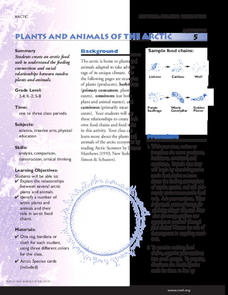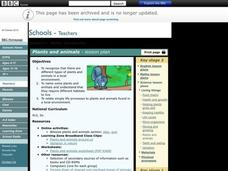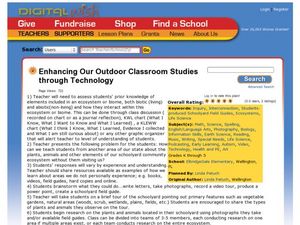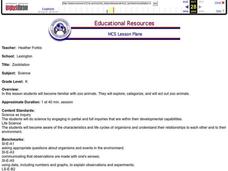Curated OER
Animals Galore
A well-designed lesson which covers the characteristics of the animals found in the six animal groups is here for your young biologists. In it, learners divide up into six groups; the amphibians, reptiles, mammals, birds, fish, and...
National Wildlife Federation
Plants and Animals of the Arctic
The Arctic food web may be more limited than other environments, but it has all the same components. With an interactive activity, pupils assume the roles of the components of an Arctic food chain. They move around and link themselves to...
Curated OER
Dinnertime for Animals
Is a deer an herbivore? What about a spider? Experiment with the food chain in an interactive science experiment. After listing the herbivores from a selection of animals, third and fourth graders compare the skulls and teeth of...
Curated OER
Prairie Scavenger Hunt
Middle schoolers take a close look at the prairie environment. They identify common plants and animals of the prairie. In addition, pupils work in teams in order to put together a presentation on a certain aspect of the prairie...
Curated OER
Flora and Fauna of the Hill Neighborhood
Students compare and contrast the characteristics of plants and animals. In this ecology lesson plan, students observe the outdoors and describe the relationship among different living things. They relate plant diversity with animal...
Curated OER
Introduction to Watsonville Wetlands
Identify the different plants and animals found in wetlands, your class will explain the importance of wetland ecosystem and locate the different wetlands in their area.
Curated OER
Rainforest Plants and Animals -- Where Are They?
Students identify the plant and animals in the rainforest. Using the internet, they research how these plants and animals adapt to survive in this type of environment. In groups, they critique artwork and discuss how they were depicted.
Curated OER
Plants and Animals
Students discuss the different types of plants and animals in a local environment. In this science lesson, students name some plants and animals understanding that they require different habitats to live. Students use computers to...
Curated OER
Enhancing Our Outdoor Classroom Studies through Technology
Combine science, math, and more using this resource. Learners use technology to share video and other information about their community with people throughout the state. They learn about the environment, identifying native plants, record...
Curated OER
Got Plants
Second graders discover that all living things need food in order to live. In groups, they examine the interconnectedness between animals and plants. They identify which animals eat plants to survive and which animals eat animals that...
Curated OER
Plants, Animals and Our Environment
Students draw and label the basic needs of animals. They draw and label the basic needs of plants. Students understand the basic needs of plants and animals are not only the same, but are interrelated. They know that the environment...
Curated OER
Animals Vocabulary Fill Puzzle
In this science worksheet, students figure out the answers to 15 clues going across and down associated with vertebrate animals. Students fill in a crossword puzzle.
Curated OER
Itaipu Dam and Power Plant (Brazil and Paraguay)
Learners study South America's Itaipu Dam and Power Plant in order to gain an understanding that hydroelectric power is a major means of generating electricity throughout the world. They also look into the environmental impacts that...
Captain Planet Foundation
Rotting Away
What happens at the end of a plant's life cycle? Show kids the natural way that plants show that they're decomposing, as well as the importance of compost, with a lesson about living organisms. After reading Log Cabin by Anne Schreiber,...
Curated OER
Plant Power
Here is an opportunity for your first graders to take a close look at plants: what they need to survive, how they grow, and the names of each plant part. The book, Corduroy's Garden is used to open the lesson. Then, youngsters utilize...
Curated OER
Friends on the Farm
Young farmers explore the world of farm animals. They are introduced to a variety of animals, what their role is, how many legs they have, and what sounds they make. Worksheets and websites embedded in the plan are used to carry it out....
Curated OER
Zoobilation
Youngsters become familiar with zoo animals. They sort them into categories, and choose an animal to act out. Two zoo centers are created in the classroom that have examples of the animals for the pupils to play with. Then, they choose...
Curated OER
Salt Marsh Plants and Animals
In this salt march plant and animals learning exercise, students read descriptions of animals, then match each to its picture. Students then read about tidal animals and choose which animals in picture are most likely to be in a salt...
Curated OER
Animals and Engineering
Learners study animal classification and their interactions. In this animals and engineering lesson students study animal communities and how engineers use this knowledge to create new technologies.
NOAA
Why is Hawaii's Ocean Important?
Studying the oceans? Focus on Hawaii's ocean with a resource packed with activity-based worksheets. Everything from products that come from the ocean to the abundance of plants and animals that call the ocean their home, Hawaii's ocean...
Curated OER
Dependence and Interdependence
Third graders explore the dependence and interdependence that plants and animals in every environment have on one another. They examine how plants and animals depend on each other for survival. Students complete a variety of experiments...
Curated OER
The Living Environment
Students use a spoon, clothespin, scissors, and toothpicks to simulate how animals get food in their environment. In this environment lesson plan, students learn about the adaptations animals make in order to survive.
Curated OER
Biomes
Arranged as an interactive lesson, this presentation focuses on the six world biomes. Upcoming biologists click on a specific biome and a slide lists its location, description, native plants, and animals. A quiz provides learners with...
Curated OER
Native Plants: An Outdoor Scavenger Hunt
Students recognize various California native species by their physical appearances and characteristics. They recognize the adaptations that plants make to their surroundings and how humans make use of plants.

























